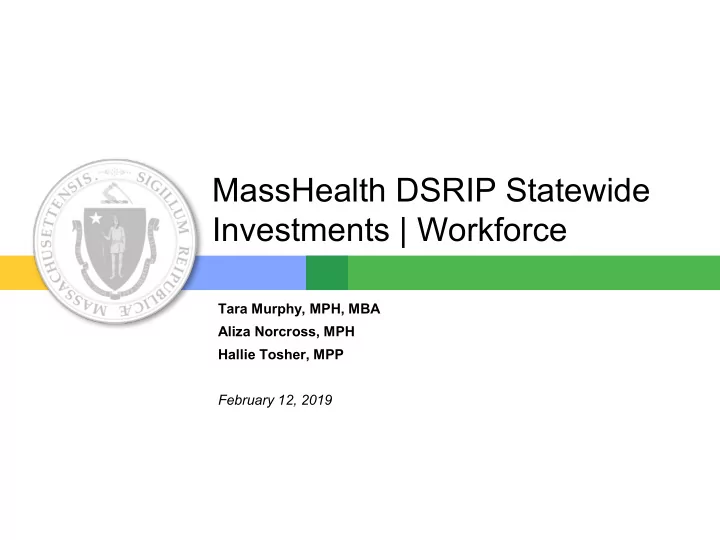

MassHealth DSRIP Statewide Investments | Workforce Tara Murphy, MPH, MBA Aliza Norcross, MPH Hallie Tosher, MPP February 12, 2019
DSRIP Funding Overview • Delivery System Reform Incentive Payment (DSRIP) Program totals $1.8B over five years and supports four main funding streams • Eligibility for receiving DSRIP funding will be linked explicitly to participation in MassHealth payment reform efforts ▪ Supports Accountable Care Organization (ACO) investments in primary care providers, infrastructure and capacity building, flexible services, and ACO (60%) expansion of ACO model to safety net providers $1.0B ▪ Funding contingent on being procured as an ACO; and partnerships w/ Community Partners ▪ Supports Behavioral Health (BH) and Long Term Services and Supports (LTSS) Community Partner (CP) care coordination , CP and Community Community Service Agency (CSA) infrastructure and capacity building , and new funding into community-based organizations Partners (30%) ▪ CP funding contingent on being procured as CP; & partnerships w/ ACOs $547M ▪ DSRIP CSA funding contingent upon selection as part of the Infrastructure and Capacity Building Funding for Community Service Agency procurement Investment Allows state to more efficiently scale up statewide infrastructure and Statewide workforce capacity Investments (6%) Examples include workforce development and training and technical $115M assistance to ACOs and CPs Implementation/ ▪ Small amount of funding will be used for DSRIP operations and Oversight (4%) implementation , including robust oversight $73M 2
Statewide Investments • Building and Training the Primary Care and Behavioral Health (BH) Workforce: This series of investments aims to support recruitment, retention, and training of primary care providers, behavioral health providers, and the frontline healthcare workforce in community-based settings. The investments within this category are: 1. Student Loan Repayment Program 2. Primary Care/Behavioral Health Special Projects Program 3. Investments in Community-based Training and Recruitment 4. Workforce Development Grant Program • Capacity Building for ACOs, CPs, and Providers: This series of investments aims to provide direct technical assistance and shared learning opportunities for ACOs and CPs, as well as support for providers who are not yet participating in alternative payment methods to prepare for APM adoption in the future. The investments within this category are: 5. Technical Assistance 6. Alternative Payment Methods Preparation Fund • Initiatives to Address Statewide Gaps in Care Delivery: This series of investments aims to improve the care provided to members with specific behavioral health and accessibility needs through technology solutions and grant funding opportunities. The investments within this category are: 7. Enhanced Diversionary Behavioral Health Activities 8. Improved Accessibility for People with Disabilities or for whom English is not a Primary Language 3
Workforce Development Grant Program | CHWs 4 Community Health Workers • CHWs are critical to high-functioning complex care management teams • Expected influx of CHW hiring from ACOs and CPs combined with reported waitlists at existing CHW core competency training programs • Over the past few years, Massachusetts has been working to enhance the professionalization of the field through legislation and subsequent efforts. • The state is beginning to certify CHWs based on Chapter 322 Acts of 2010 • CHWs can obtain voluntary certification • CHW core competency training programs can be approved to offer core competency certification training SWIs Supporting CHWs • Community Health Worker Training Capacity Expansion Grants • Community Health Worker Supervisor Training Incentive Fund • Community Health Worker and Peer Specialist Learning Communities 4
Community-Based Workforce Development 1 Why Invest in Community-Based Providers? Providing Quality, Cost-Effective Care • Provide high-quality, culturally competent, team-based care • Serve a significant proportion of Massachusetts Medicaid members • Play a key role in fulfilling MassHealth restructuring goals Workforce Challenges • Clinical vacancies • Difficulty offering competitive salaries • Often challenging work environments • High burnout 5
SWIs Supporting Community-Based Providers 1 Student Loan Repayment Program Eligible Providers Max Loan Number of Number of Complete Awarded Repayment Slots Applications (over two years) Received Family physicians, general internists, pediatricians, 29 20 $50,000 psychologists, psychiatrists Advanced Practice Registered Nurses (APRNs), Nurse 24 13 Practitioners (NPs), Physician Assistants (PAs), Psychiatric $30,000 Care Nurse Specialists (PCNAs) Licensed Independent Clinical Social Workers (LICSWs), Licensed Certified Social Workers (LCSWs), Licensed Mental Health Counselors (LMHCs), Licensed Marriage and Family $30,000 69 37 Therapists (LMFTs), Licensed Alcohol and Drug Counselors I (LADC1s)* Total Number of Slots 122 70 Behavioral Health Workforce Development Program • 43 licensed and unlicensed BH providers were selected Learning Days • Address clinician burnout 6
SWI Program Assessment and Evaluation Evaluation Vehicles • Independent Evaluator • University of Massachusetts Medical School • Independent Assessor • Public Consulting Group • Process Metrics • Inform programming for year two • Program-Specific Impact Metrics • Surveys 7
Recommend
More recommend